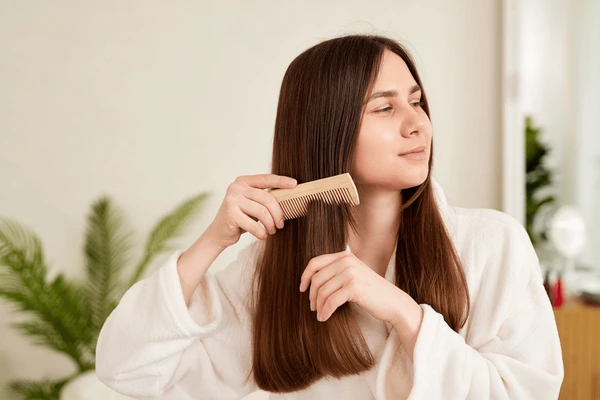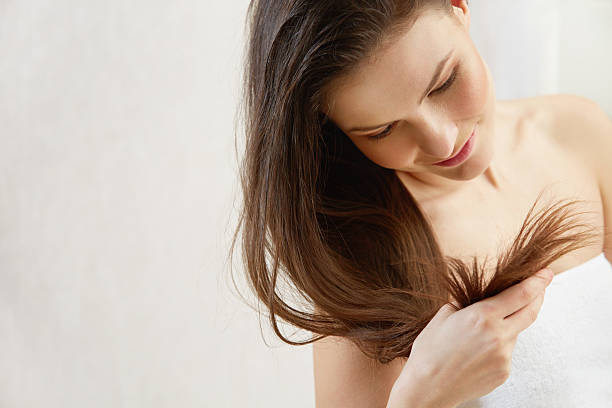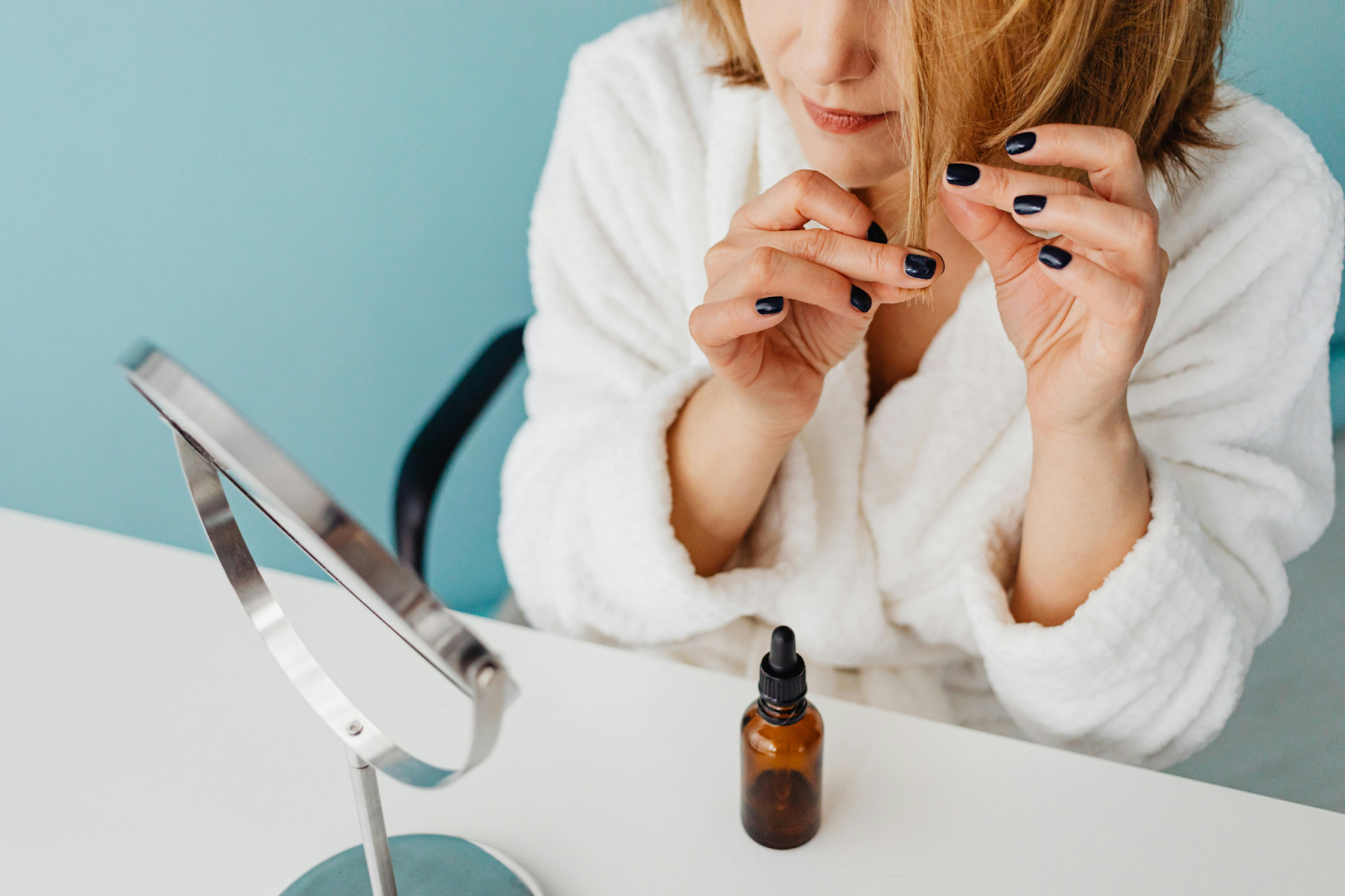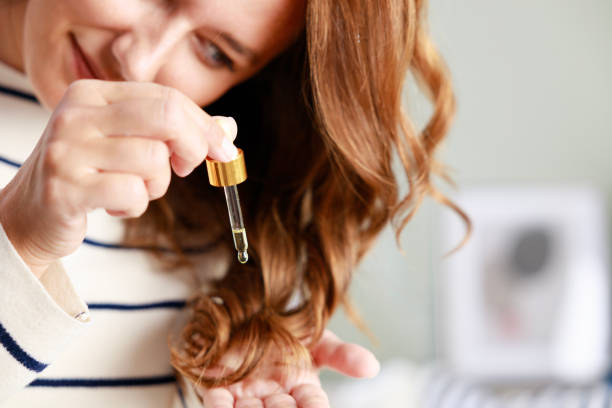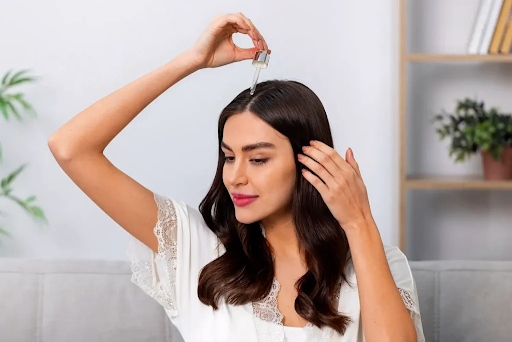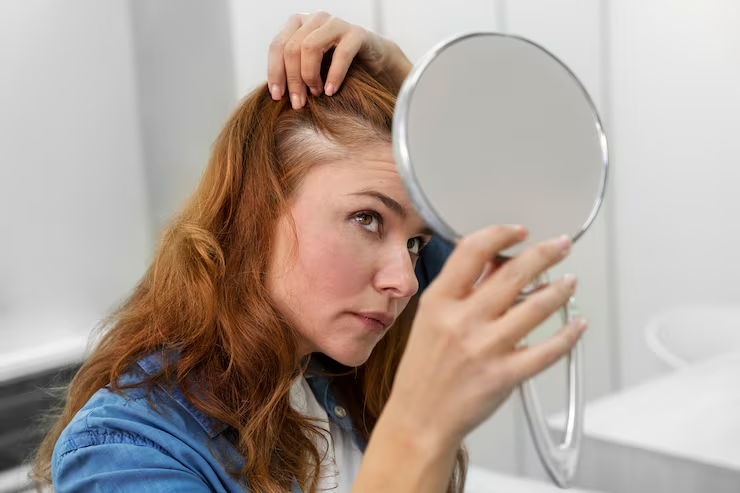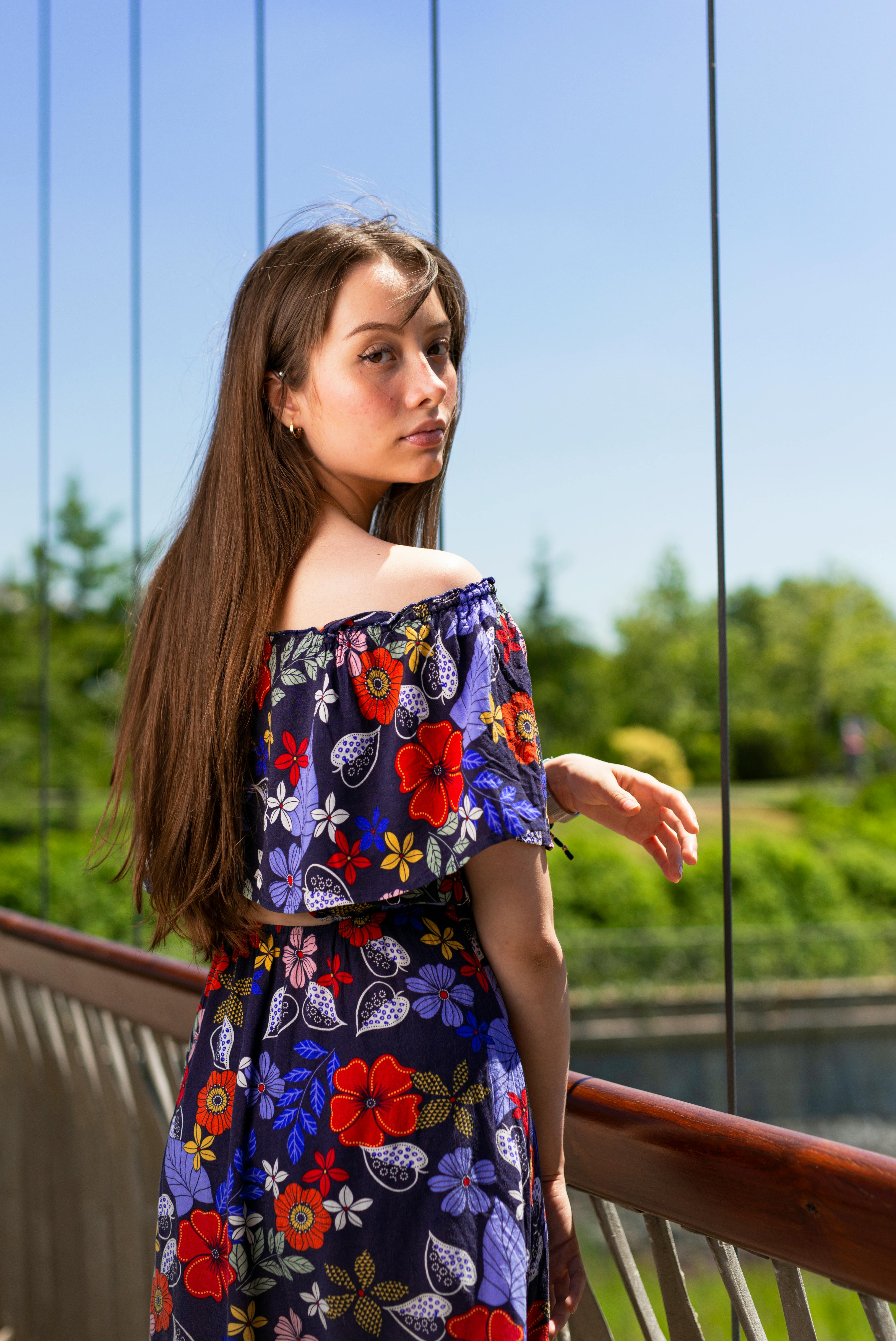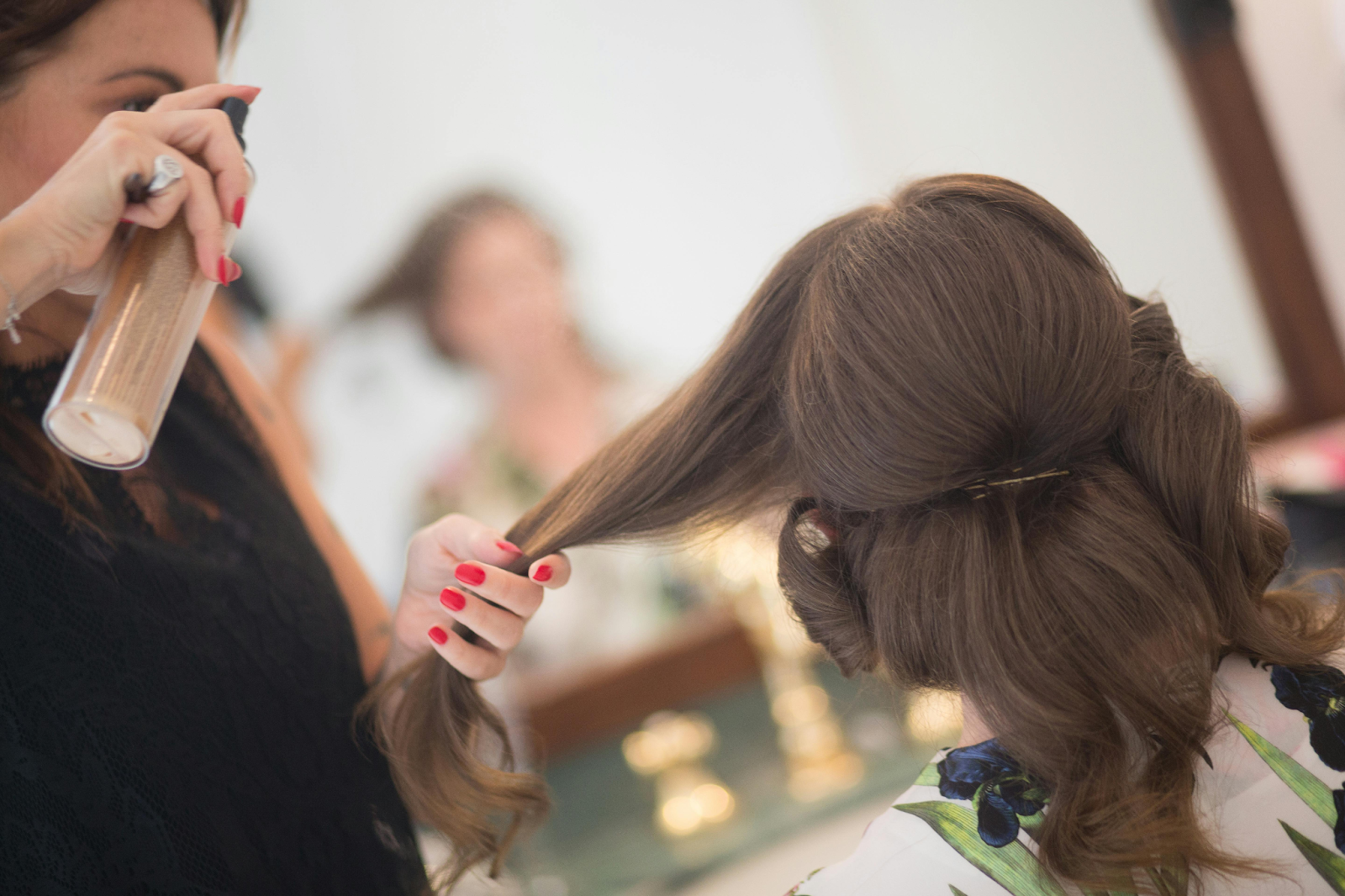Does Hair Loss & Thinning from Menopause Grow Back: What You Need to Know
BY TRYBELLO
Jul 15, 2025

Key Takeaways
- Menopausal hair loss is primarily caused by hormonal changes that shrink hair follicles and shorten the hair growth phase, but it's not always permanent.
- Most women can experience some level of hair regrowth after menopause, though your hair texture and thickness may differ from your pre-menopausal hair.
- A multi-pronged approach combining proper nutrition, scalp care, and appropriate treatments can significantly improve hair regrowth outcomes.
- Starting treatment early when you first notice thinning can lead to better results for postmenopausal hair regrowth.
- Trybello Hair Helper Spray specifically targets hormonal hair loss challenges with biotin for structural strengthening, caffeine for follicle stimulation, and castor oil for improved circulation, all delivered through an easy-to-use spray format with a 120-day growth guarantee.
Menopausal Hair Loss Reality
Menopausal hair loss isn't just "in your head,” it's a real physiological response to the significant hormonal changes your body undergoes during this transition. When estrogen levels drop, male hormones (androgens) become more dominant, causing hair follicles to shrink and the growth phase of your hair to shorten. The result is thinner, weaker strands that break easily and fall out more readily.
Unlike temporary shedding from stress or illness, menopausal hair changes develop gradually over months or years. You might notice your part widening, your ponytail feeling thinner, or more scalp visibility when styling your hair. This progressive thinning can affect your self-image and confidence, but understanding the process is the first step toward effective management.
Common Menopausal Hair Loss Patterns
Menopausal hair thinning typically follows predictable patterns that differ from male pattern baldness. Rather than receding at the temples or developing a bald spot at the crown, women generally experience diffuse thinning throughout the scalp. You'll likely notice widening of your part line and increased visibility of your scalp, especially at the crown area.
Many women also report thinning along the front hairline, which can dramatically change your facial framing. Unlike men, complete baldness is rare with menopausal hair loss. Instead, the overall volume decreases gradually, with hair becoming progressively finer and more sparse. This diffuse thinning pattern is distinctive enough that dermatologists can often recognize hormone-related hair loss simply by observing the distribution pattern.
Normal vs. Concerning Loss
While some degree of thinning is expected during menopause, certain signs warrant medical attention. These include sudden, patchy hair loss, significant scalp itching or burning, visible scalp inflammation, or losing handfuls of hair at once.
These symptoms could indicate other conditions like alopecia areata, thyroid disorders, or nutritional deficiencies that require different treatment approaches. We always recommend consulting with a healthcare provider if your hair loss seems excessive or is accompanied by other concerning symptoms.
“Doctor-Approved Natural Spray Rapidly Boosts Growth & Thickness.
Why 100,000+ Women Are Switching to The TryBello All-Natural Solution!"
Join over 100,000 happy customers who’ve transformed their hair with our natural, doctor-formulated spray—rated 4.8/5 by more than 40,000 real users.
Proven Natural Ingredients
- • Caffeine Extract – Naturally blocks DHT and boosts blood flow to hair follicles
- • Biotin – Absorbs directly through the scalp for maximum results—no pills needed
- • Castor Oil – Soothes inflammation and locks in deep, lasting moisture
- • Rice Water Extract – Packed with proteins and minerals to strengthen hair and reduce shedding
Get Visible Results in 12 Weeks
- • Up to 45% increase in hair thickness
- • Reduces shedding and unclogs hair-draining nightmares
- • Supports regrowth in thinning areas
- • Leaves hair soft, shiny, and full of life
Ironclad 120-Day Growth Guarantee
No results after 4 months? Get 100% of your money back—no questions asked.


★★★★★
I started using this twice a day because I noticed my hairline receding. Didn’t pay attention to track results, now my stylist told me my hair has grown a lot since my last root touch up. I'm impressed! - Bailey

Can Menopausal Hair Regrow?
Can hair lost during menopause actually grow back? The encouraging answer is yes, in many cases. Menopausal hair thinning is often not permanent, especially when addressed with appropriate interventions. Once your hormones stabilize in post-menopause and with proper treatment, many women experience significant regrowth.
Temporary vs. Permanent Thinning
Not all menopausal hair thinning is created equal. The good news is that most hormone-related hair loss during menopause is temporary and can improve with the right approach. When hair loss is primarily driven by hormonal fluctuations, the follicles typically remain alive but dormant, making regrowth possible once hormones stabilize or treatments begin.
Permanent hair loss occurs when follicles are completely damaged or destroyed. This is more common with genetic pattern hair loss that's simply accelerated by menopause rather than caused by it. The key difference lies in how quickly you take action. Hair follicles that have been dormant for many years become increasingly difficult to reactivate, making early intervention crucial for maximizing your regrowth potential.
Regrowth Timeline Expectations
Patience is essential for hair regrowth after menopause. The hair growth cycle operates slowly, and visible improvements typically take at least 3–6 months of consistent treatment. Most women notice decreased shedding first, followed by new baby hairs appearing along the hairline and part.
Full results may take 12–18 months, as each hair must progress through its complete growth cycle. Remember, new growth will initially appear as fine, short hairs that gain thickness and length over time. This gradual timeline can be frustrating, but consistent treatment pays off.
Who Sees Better Results
Several factors influence who experiences better hair regrowth results after menopause. Women who begin treatment early, typically within the first year of noticing thinning, generally see more significant improvements.
Your overall health plays a major role too. Women with well-controlled hormones, good nutritional status, managed stress levels, and no underlying medical conditions typically experience superior regrowth. Genetic factors also matter. If women in your family have historically maintained good hair density after menopause, your chances improve.
Factors Affecting Regrowth

Hair regrowth after menopause doesn't happen in isolation; it's influenced by a complex interplay of internal and external factors.
Hormone Balance Impact
The balance of estrogen, progesterone, testosterone, and other hormones directly influences your hair growth patterns. Estrogen supports hair growth by extending the anagen (growth) phase, while elevated levels of androgens can promote follicle miniaturization and thinning. When these hormones stabilize post-menopause, some natural regrowth may occur, but often additional support is needed.
Genetic Predisposition
The presence of certain gene variations can make your hair follicles more sensitive to androgens, accelerating thinning during hormonal transitions. This genetic component helps explain why hair loss patterns often resemble those seen in female relatives.
While you can't change your genetics, understanding your family history helps set realistic expectations and guides treatment choices. Women with strong genetic factors may need more aggressive treatment approaches but can still achieve meaningful improvements.
Nutritional Status
Your hair follicles require specific nutrients to function optimally and produce healthy hair strands. Deficiencies in iron, vitamin D, zinc, B vitamins, and essential fatty acids are particularly damaging to hair growth. Menopause often coincides with changing nutritional needs, making adequate intake even more crucial during this time.
Protein is especially important, as hair is primarily made of keratin, a protein. Without sufficient dietary protein, your body prioritizes essential functions over hair growth. Eating healthy provides your follicles with the building blocks they need to produce stronger, thicker hair.
Stress Levels

Chronic stress creates a perfect storm for hair loss through multiple mechanisms.
Stress hormones like cortisol can push hair follicles prematurely into the resting phase, leading to increased shedding. The stress of menopause itself can compound this effect, creating a vicious cycle of hormone disruption and hair thinning.
Sleep disruption, common during menopause, further elevates stress hormones and impairs cellular repair processes. The body's stress response also diverts resources away from "non-essential" functions like hair growth, prioritizing survival functions instead.
Managing stress through techniques like mindfulness, adequate sleep, gentle exercise, and social connection creates a more favorable internal environment for hair regrowth.
Medical Treatment Options for Menopausal Hair Loss
Hormone Replacement Therapy
Hormone replacement therapy (HRT) can benefit hair growth by restoring estrogen levels that support the hair growth cycle. For many women, HRT helps stabilize hormone-related hair thinning by extending the growth phase of hair follicles.
However, HRT isn't suitable for everyone, particularly those with certain health risks like a history of breast cancer or blood clots. The decision to use HRT should always involve a thorough discussion with your healthcare provider about the potential benefits and risks.
Minoxidil Benefits
Topical minoxidil (available as Rogaine or other brands) is an FDA-approved treatment for female pattern hair loss. This medication works by extending the growth phase of hair and increasing blood flow to follicles. The formula, applied directly to the scalp, typically produces visible improvements within 3–6 months of consistent use.
The key with minoxidil is patience and consistency; it must be used twice daily for optimal results, and stopping treatment will eventually reverse any gains. While some women experience mild scalp irritation initially, this often resolves with continued use.
Prescription Medications
Beyond minoxidil, several prescription medications can help combat menopausal hair loss. Spironolactone, though not FDA-approved specifically for hair loss, works by blocking androgen receptors and can be particularly effective for hormone-related thinning. Low-dose oral minoxidil is also gaining popularity as an alternative to the topical version, though it requires careful medical supervision.
Natural Approaches
Natural Supplements
Your hair follicles require specific nutrients to function optimally. Iron, zinc, vitamin D, B-complex vitamins (especially biotin), and omega-3 fatty acids play crucial roles in hair growth cycles.
Eating meals rich in colorful vegetables, lean proteins, healthy fats, and whole grains provides these essential nutrients. However, for many women, targeted supplementation may be necessary to reach optimal levels, particularly during and after menopause when nutritional needs shift. A good example of a supplement to incorporate into your diet is our Trybello Hair Repair and Anti-Stress Gummies, which contain high amounts of zinc required to foster hair growth.
Scalp Massage Benefits
Regular scalp massage stimulates blood circulation to hair follicles, delivering more oxygen and nutrients while helping remove waste products. This improved microcirculation creates a healthier environment for hair growth. Studies show that just 4 minutes of daily scalp massage can increase hair thickness over time.
Beyond the physical benefits, scalp massage activates sensory neurons that may help regulate certain growth factors and hormones that affect hair follicles. The practice also reduces stress, which is beneficial since high cortisol levels can contribute to hair thinning.
Natural Products That Work
While many natural hair growth products claim to promote hair growth, choosing the right product requires careful consideration and understanding the root cause of your hair loss.
Trybello’s serum combines evidence-backed ingredients in optimal dosages to support your body's natural hair growth processes during and after menopause.
Trybello's Promise: Reclaiming Your Hair Confidence Through Menopause
At Trybello, we recognize that maintaining your sense of self and confidence during a significant life transition is important. Our Trybello Hair Helper Spray was specifically engineered to address the multifaceted nature of hair loss through scientifically backed ingredients that work synergistically.
Our formulation features biotin to rebuild hair structure weakened by declining estrogen levels, caffeine to reawaken follicles affected by hormonal slowdown, and castor oil to restore circulation that naturally diminishes with age. The addition of rice ferment filtrate provides essential nutrients, while ginger extract stimulates the scalp environment, and glycerin ensures deep hydration for aging hair follicles.

Simply spray 1–2 pumps on your hair, focusing on the areas experiencing thinning, massage gently for 30–60 seconds to enhance absorption, and style as usual.
You don't need to wash your hair before application. For optimal results, use the spray daily. While genetics and individual factors influence your specific recovery timeline, the majority of women experience meaningful improvements when they approach their hair care consistently.
Your menopausal journey is unique, and so is your path to hair restoration. At Trybello, we're honored to be part of your restoration journey, providing the tools and support you need to emerge from menopause with confidence, grace, and beautiful hair that reflects your inner strength.
TRY OUR BELLO HAIR HELPER SPRAY NOW →
Frequently Asked Questions (FAQs)
Trending Topics
See our latests posts #TRYBELLO



